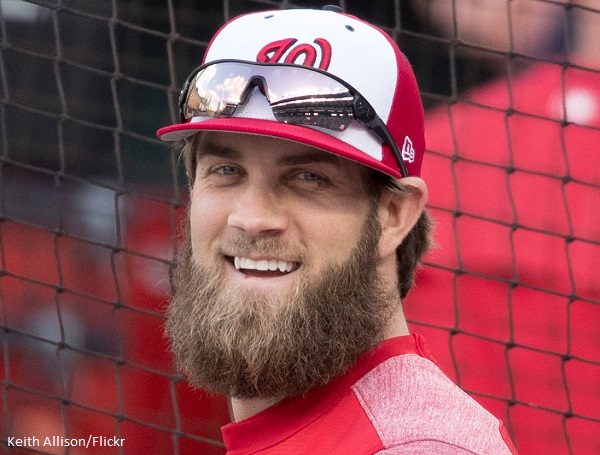Five most interesting details about Bryce Harper’s contract with Phillies

Bryce Harper’s free agency has finally ended with the former NL MVP signing a 13-year, $330 million deal with the Philadelphia Phillies. The contract is a record-setter — the $330 million is the most guaranteed money ever for an MLB player. There has been a mixed reaction to the deal, with many people freaking out over the length of the contract. I think it’s a great deal for the Phillies and that Harper will crush for them.
Though the deal has now been completed, that does not mean there isn’t plenty of analysis to be done. We’ve picked out some extremely interesting details that may have been overlooked.
1) Harper’s deal comes with the “Three Nos”
Harper’s deal includes a no-trade clause, no opt-outs, and no deferred money. Harper showed that he wanted long-term security and the confidence of knowing he would be playing for one team. The no deferred money is also key — that means he will receive all $330 million in the 13 years, making that money more valuable in present dollars (due to inflation) than if he were paid part of that money beyond the length of his contract. Keep in mind, just because he has a no-trade clause does not mean he won’t ever be dealt; it just means he has to be consulted first and approve a trade before it happens.
2) He could have made $45 million in average annual value on a shorter-term deal
According to a tweet from the New York Post’s Joel Sherman, agent Scott Boras said Harper received offers that included $45 million in average annual values on short-term deals.
Spoke to Boras, who told me: “We had average values of $45M offered on shorter term deals. We had a full buffet.” Said length, commitment now and in future offered by ownership, plus ballpark turned Harper to the #Phillies
— Joel Sherman (@Joelsherman1) February 28, 2019
Harper chose the full guaranteed amount — the most long-term security — over the greater amount in the short-run. That’s the same logic that led Manny Machado to pick the Padres over the White Sox’s offer. He’s only getting around $25 million in average annual value, but the long-term security apparently was too much to pass up.
3) His reported $300 million offer from the Nationals was not what it seemed
There was talk all offseason that Harper passed up a 10-year, $300 million offer from the Washington Nationals. While going to a new team was probably best for Harper’s career, it’s important to note that the $300 million offer from the Nats is not what it seemed. According to The Washington Post’s Barry Svrluga, the contract called for around $100 million in deferred money that would have spread out payments until Harper was about 60 years old.
Some context on the Nats' 10-year, $300-million offer:
I'm told from two sources that a significant — like, made MLB queasy — amount of money was deferred. One source said it included $100-million in deferrals and paid Harper until he was 60.
The PHI deal has no deferrals.
— Barry Svrluga (@barrysvrluga) February 28, 2019
What $10 buys you in 2019 will probably cost around $20 by 2050. That non-deferred money is a significant difference in total value.
4) The Giants did discuss a 10-year deal with Harper
The Giants were one of the teams in the mix for Harper but reportedly had some reluctance about the length of a deal Harper sought. In the end, reporters confirmed that Harper did have a 10-year offer from the Giants.
Bryce Harper did, in fact, receive a 10-year offer (at least verbally) from #SFGiants, source confirms @PavlovicNBCS’s report from yesterday. @MLBNetwork @MLB
— Jon Morosi (@jonmorosi) February 28, 2019
The money probably wasn’t at a level where Harper wanted it to be if he chose Philly over the Giants.
5) Dodgers would not go to 10 years
According to Jon Morosi, the Dodgers did not offer Harper a 10-year contract.
The Dodgers did not offer Bryce Harper a 10-year contract, source confirms. @MLB @MLBNetwork
— Jon Morosi (@jonmorosi) February 28, 2019
Harper seemed to want to sign with the Dodgers, but they were unwilling to make the long-term commitment to him. That sticks with precedence for Andrew Friedman, who has long shown an aversion to long-term contracts. He prefers flexibility and does not want to tie himself into a deal where he’ll likely be carrying around an unproductive, expensive player later on.
